Shin of Beef Good for Boeuf Bourguignon
I t's a mystery to me how this giant of the French classical repertoire has escaped the clutches of this column for so long. Richard Olney (another big beast of the Gallic cookery scene) describes boeuf bourguignon as "probably the most widely known of all French preparations", while Elizabeth David introduces it as "a favourite among those carefully composed, slowly cooked dishes, which are the domain of French housewives and owner-cooks of modest restaurants rather than of professional chefs".
Sounds manageable. Yet Olney goes on, slightly worryingly, that "beef burgundy certainly deserves its reputation – or would if the few details essential to its success were more often respected. There is nothing difficult about its preparation, but there are no shortcuts." And David doesn't help the situation, with the airy assertion that "such dishes do not, of course, have a rigid formula, each cook interpreting it according to her taste".
According to Larousse Gastronomique, la bourguignonne refers to anything (generally "poached eggs, meat, fish or sauteed chicken") cooked with red wine and "usually garnished with small onions, button mushrooms and pieces of fat bacon". That much we know. Everything else, it seems, is up for grabs.
The beef
While, like most stews, this will work with almost all slow-cooking cuts, chefs have their own particular preferences. Simon Hopkinson and Lindsey Bareham call for "well-hung sinewy beef – chuck, shoulder or shin perhaps" in The Prawn Cocktail Years. Anthony Bourdain's Les Halles Cookbook specifies paleron of beef, which, a helpful butcher informs me, means featherblade. Richard Olney's much lauded French Menu Cookbook suggests Desperate Dan-style heel (which takes a while to track down) and Michel Roux Jr's The French Kitchen opts for "braising beef (chuck is good but cheek is best)". Harry Eastwood is also a fan of cheek, writing in Carneval that: "My father introduced me to the joys of eating cheeks … [and] it turns out that beef cheeks are the perfect vehicles for a bourguignon since they absorb all the flavours in the pan and the meat surrenders completely."
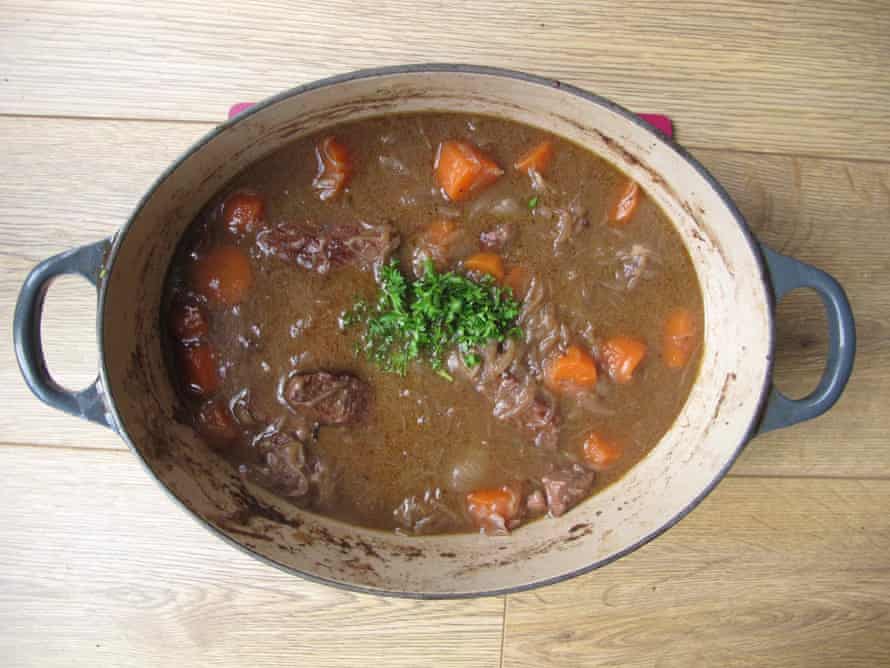
Featherblade proves the least successful with testers – it's just too lean, which makes it seem rather dry in comparison with the more gelatinous cuts. A good well-marbled chuck (not always the case with supermarket versions) does the job, and the more gelatine-rich shin and heel are even better, but my own favourite is the cheek, which seems to offer the best balance between meat and melt. Cut it into relatively large chunks because, as Hopkinson and Bareham observe, "A true boeuf à la bourguignonne is not about little cubes of meat stewed in Hirondelle."
Olney's is the only recipe to marinate the meat before use; Roux cautions against it, warning that "I find this makes for a gamey flavour that's not entirely true to the original". Some testers agree, but my problem with it is that, far from tenderising the meat, it seems oddly to have dried it out slightly. Whether or not the wine is actually to blame, the meat should have plenty of time to absorb its flavour in the oven, rendering such a step pointless.
Hopkinson and Bareham also add a gelatine-rich pig's trotter to the stew, presumably in order to give it body and richness. This certainly works, but trotters are not always easy for everyone to get hold of. One tester suggests that the more commonly available oxtail might do the same job even better is a good one. You can leave it on the bone if you like, although I prefer to strip it off after cooking so the meat is more evenly distributed.
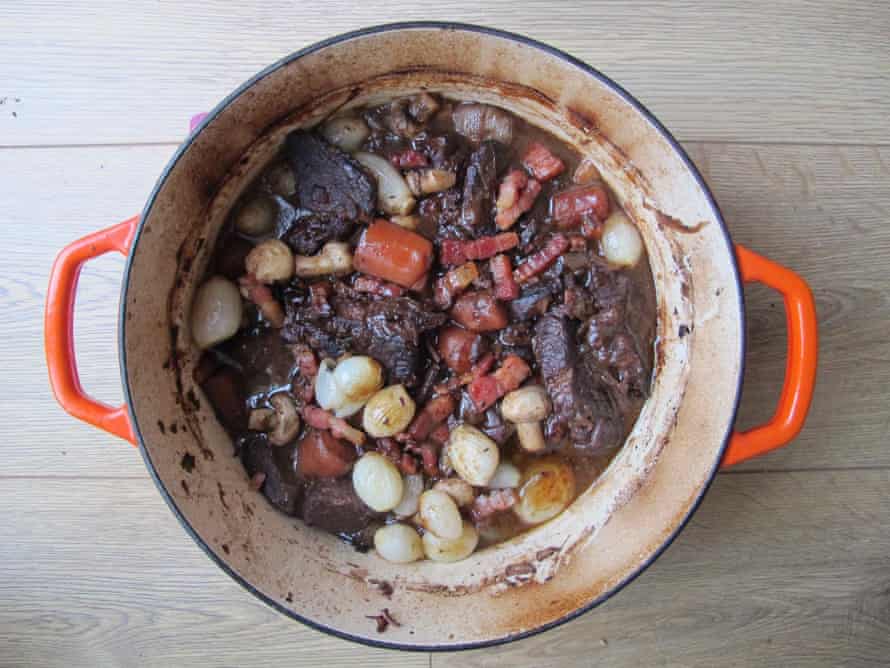
The pork
Boeuf bourguignon almost always contains cured pork, too – after all, this is a French recipe, and two meats are better than one. Certainly my testers are not happy with its omission in Bourdain's dish. Olney, who I am quickly learning to fear, warns me that "if good lean salt pork is not available, omit it; do not substitute bacon, the smoky flavour of which … distorts and muddles the otherwise clean, distinct flavour of the sauce". Proving that one man's muddle is another's masterpiece, Eastwood's smoked lardons and Roux's smoked streaky don't seem to go down too badly with the panel, but the simpler savoury flavour of green bacon seems less likely to distract from the wine, which is, after all, the whole point of the dish. (If you have access to salt pork, you may wish to poach it briefly before use to tame its aggressive salinity, as Olney does. There's no need with bacon or pancetta – you'll only spoil it.)
The vegetables
The traditional Burgundian garnish of button mushrooms and miniature onions ought to be non-negotiable, preferably sauteed until golden in the fat from the bacon, as Eastwood, Olney, Hopkinson and Bareham suggest. In this way, they absorb some of its savoury richness. The Prawn Cocktail Years recipe adds the vegetables to the stew for the entire cooking time, while Roux and Olney cook them through separately, which is a bit of a faff, especially when the former demands they're done in three separate pans. All very well with a kitchen brigade at your disposal, but I prefer Eastwood's method, which adds the the sauteed vegetables to the beef for the final half hour of cooking instead. Much easier.
Instead of the tiny pearl onions most recipes recommend, Bourdain uses the ordinary kind, thinly sliced and caramelised. Some testers like the sweetness they add to the dish, but we all agree their assertive flavour does give his version something of the soupe à l'oignon. If you can't find pearl onions or another diminutive variety, small shallots are better than nothing.
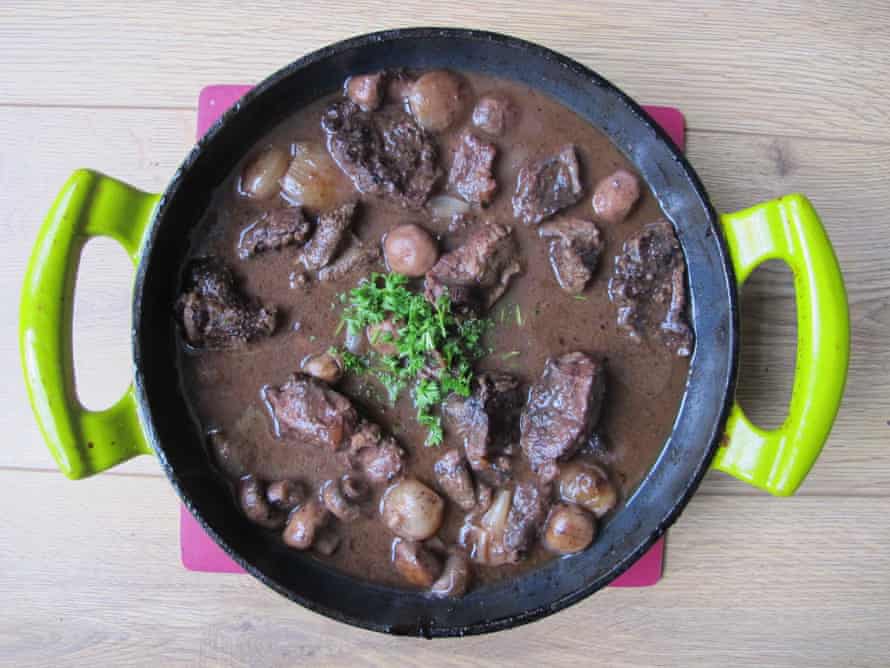
Carrots are also common; the baby variety favoured by Eastwood and Roux make the most pleasing garnish aesthetically, but ordinary sized ones, cut into large chunks, work just as well in the flavour department. (The same goes for ordinary mushrooms as opposed to the button sort.)
The liquids
The principal flavour here ought to be dry, fruity red wine of the kind produced in Burgundy, although for those of us buying wine in the UK, I'm not convinced that sticking an actual Burgundian pinot noir into the oven for 3 hours isn't a criminal waste of both wine and money (Olney demands a "good red burgundy" no less). I make one with the authentic product (the cheapest I can find over here is nearly £9) and the rest with an inoffensive but rather cheaper red from the south-west, and no one remarks on the difference, even when it's pointed out. So, unless you have an extremely discerning palate, I'd recommend saving your cash for a good burgundy to drink with it instead.
Puzzlingly, Bourdain uses only a cup of wine in his version, which might explain why everyone describes it as more like beef stew than a bourguignon, with one observing that, "If you added some dumplings it would make a lovely hotpot." A whole bottle is required for maximum impact, preferably reduced to concentrate its flavour: Olney does so after cooking, but this involves lifting out the meat and vegetables and then warming everything back up together so it seems far easier to do all the simmering first, as Roux and the Prawn Cocktail Years recommend, so the dish can be served straight from the oven. While you're at it, add a few aromatics, as the latter recipe suggests, for a more rounded gravy.
A splash of brandy, although not absolutely necessary, does add a little more complexity to the dish. If you don't have it, however, it's not a disaster.
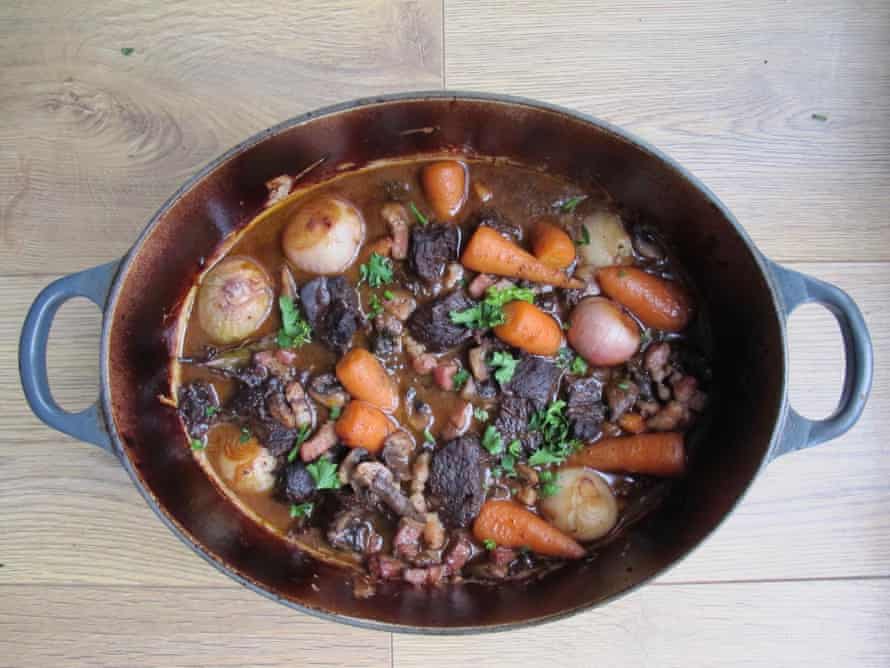
Other liquids
Most recipes also use stock of some kind, generally beef, veal or even, for a lighter gravy, Eastwood's chicken or vegetable alternative. Bourdain tops up the wine with water instead, and even with his optional couple of spoonfuls of demi glace, or concentrated veal stock, testers find his gravy thin and a little insipid. "It's just very … ordinary." And ordinary is definitely not what we're after here.
Flouring the meat will both help it brown more quickly, and thicken the sauce more quickly, though it's certainly not essential if you would prefer to keep the dish gluten-free.
Aromatics
Like any respectable French classic worth its salt, boeuf bourguignon benefits from a bouquet garni of bay, thyme and parsley, and a little garlic. If, after all that hard work, you feel it needs a little help in the flavour department for some reason (and sometimes it happens), add a dash of Worcestershire sauce before serving, as Eastwood does, although it ought not to require any tomato puree, dijon mustard or indeed Hopkinson and Bareham's redcurrant jelly. Add a dash of lemon juice if you think the dish needs it, but I like mine unapologetically rich and sticky.
Cooking and serving
You can cook boeuf bourguignon on the hob – it's no doubt the original method – but I find it much easier to keep the heat constant in a moderate oven. (Plus it's easier to clean up after yourself with the pot safely bubbling away out of sight.)
Bourguignon is traditionally served with steamed or boiled potatoes, but Roux proves he's a true Brit by preferring his with mash. Gordon Ramsay's celeriac puree would also work, as would Julia Child's buttered noodles or rice. Delia Smith, meanwhile, goes for full-on flavour with pommes boulangère or ratatouille. I agree with Roux, but each to their own – just as long as there's wine.
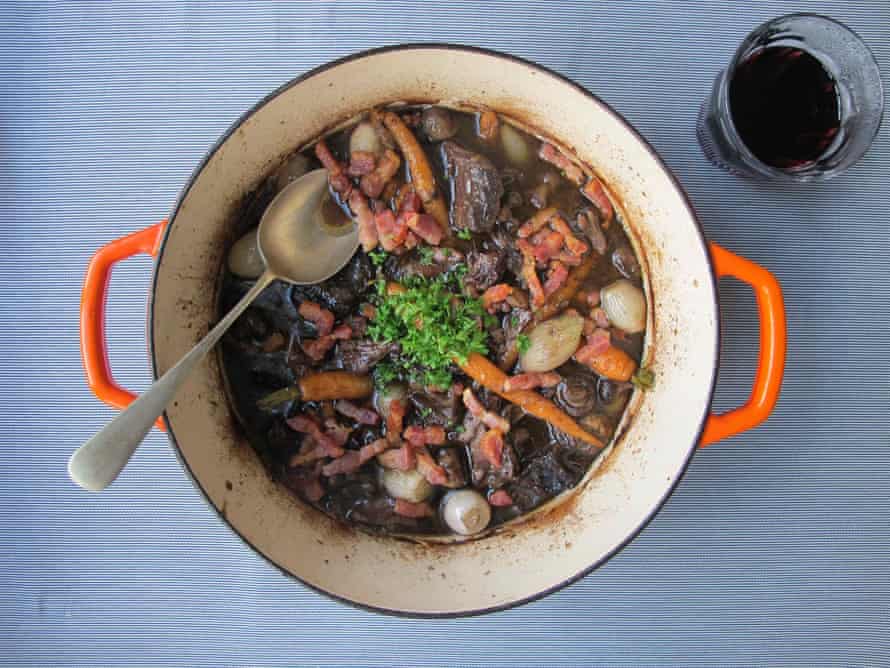
(Serves 6)
1 bottle of fruity, relatively light dry red wine
1 onion, peeled and cut into 6 wedges
1 large carrot, scrubbed and cut into 2cm chunks
2 garlic cloves, peeled and squashed with the back of a knife
1 bay leaf,
Small bunch of parsley, plus a handful for garnish
2 sprigs of thyme
2 tbsp olive oil
35g butter
200g unsmoked bacon lardons or a thick piece of unsmoked bacon cut into 2cm cubes
24 pearl onions, or 12 small shallots
18 baby carrots
200g button mushrooms
2 tbsp flour
1kg beef cheeks, cut into 3cm chunks
400g oxtail
60ml brandy
250ml good beef stock
Put the wine in a pan with the onion, carrot, garlic and herbs and bring to the boil. Simmer for 30 minutes until reduced by about half. Heat the oven to 150C.
Heat the oil and butter in a large casserole dish over a medium-high heat, and when the foam has died down, add the bacon. Fry until golden, then scoop out with a slotted spoon and set aside.
Add the bay carrots and mushrooms to the pan and saute until lightly golden, then scoop into a fresh bowl. Add the onions, turn down the heat slightly, and fry until just beginning to brown. Meanwhile, put the flour on a plate, season, then roll the beef in it. Add the onions to the other vegetables and turn up the heat slightly in the pan.
Fry the beef in batches until crusted and deeply browned, being careful not to overcrowd the pan or it will boil in its own juices (add a little more oil if it feels like it's burning rather than browning). Scoop out and set aside in a bowl. Turn up the heat.
Add the brandy to the pan and scrape to dislodge any caramelised bits on the bottom. Strain in the reduced wine (discarding the vegetables), followed by the stock. Return the cheeks and oxtail to the pan and bring to a simmer.
Cover and bake for two and a half hours, then tip in the pearl onions, mushrooms and carrots and bake for another half an hour.
Scoop out the oxtail and strip the meat from the bones. Stir back into the pan with the lardons and season to taste. Add the remaining parsley and serve with mashed potatoes.
Is it a false economy to make boeuf bourguignon with any other wine than red burgundy? What other wines would you suggest serving it with? Which classic Gallic recipes would you like to see?
preussfornevenithe.blogspot.com
Source: https://www.theguardian.com/lifeandstyle/wordofmouth/2017/mar/09/how-to-cook-the-perfect-boeuf-bourguignon
0 Response to "Shin of Beef Good for Boeuf Bourguignon"
Post a Comment